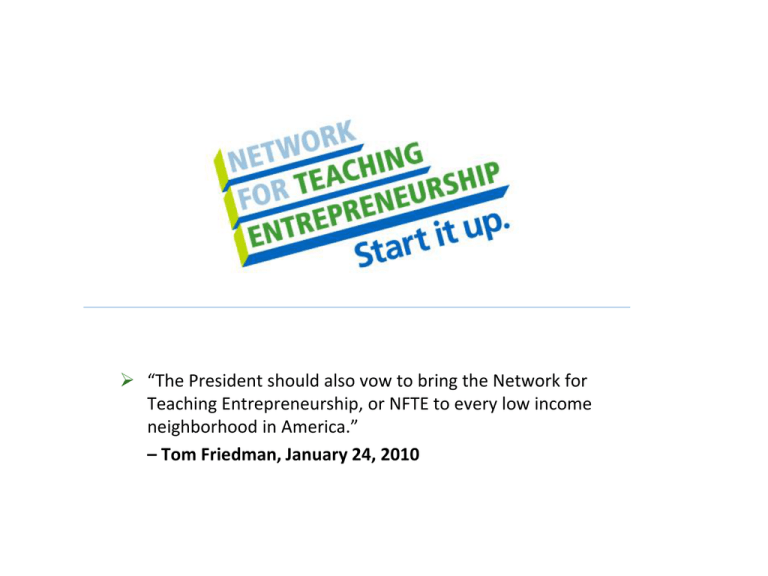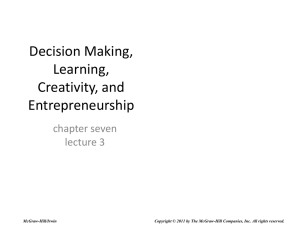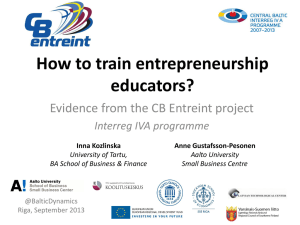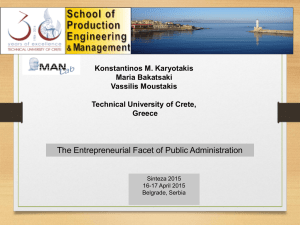
“The President should also vow to bring the Network for
Teaching Entrepreneurship, or NFTE to every low income
neighborhood in America.”
– Tom Friedman, January 24, 2010
NFTE Overview & Alignments
Founder:
Steve Mariotti
"Our program
transforms street
smarts into
business smarts"
In 1982, after getting mugged by teenagers who took $10 from him, Steve realized
he had to help youth find a better way. He made a significant career change and
became a Special Education/Business Teacher in the New York City public school
system. After teaching in notorious neighborhoods such as Bedford-Stuyvesant in
Brooklyn and the “Fort Apache” section of the South Bronx, he discovered unique
insights about connections between entrepreneurship education, learning, and
motivation, particularly among economically disadvantaged youth. This led to the
creation of a formal curriculum and the founding of the National Foundation for
Teaching Entrepreneurship (now the Network for Teaching Entrepreneurship) in
1987.
Steve Mariotti received an MBA from the University of Michigan and has studied at
Harvard University, Stanford University, and Brooklyn College. His professional
career began as a Treasury Analyst for Ford Motor Co. (1976-79). He then founded
Mason Import/Export Services in New York, eventually acting as sales
representative and purchasing agent for 32 overseas firms.
3
NFTE Today: Organizational Snapshot
Mission The Network for Teaching Entrepreneurship (NFTE) provides programs that inspire young people from low-income
communities to stay in school, to recognize business opportunities and to plan for successful futures.
Students
Target Population: young people from low-income communities, ages 11 – 18
330,000+ youth served since 1987
FY 2011 Goal: 41,000 students
Teachers
Active teacher corps: 450 U.S. and 775 International
NFTE has trained 7,000 teachers since our inception
Curriculum
Pearson Prentice Hall:
Entrepreneurship: Owning Your Future (11th edition, 2009, for high school)
Entrepreneurship: Starting & Operating a Small Business (2nd edition, 2009, for college)
BizTech 3.0: online business plan tool
Exploring Careers, middle school textbook funded by MetLife (1st edition, 2010)
AEP 2010
Distinguished
Achievement
Award Winner
for Math 9-12
Your Financial Future, financial literacy lessons and volunteer guide, in partnership with Bank of America (2 nd edition,
2010)
Ten9Eight case study book, in partnership with Scholastic (1st edition, 2010)
Peter G. Peterson Foundation: online personal financial games (1st edition due Q3 2010)
Operations & Financial Information
11 domestic program offices
Active programs in 21 states and 11 countries
FY 2011 budget is $15.8M; FY 2010 projected $14.3M
4
NFTE Program Offices and Domestic Licensees
Program Offices:
Baltimore, Bay Area
Chicago, Dallas
Fairchester
Los Angeles
New England
New York Metro
Philadelphia
South Florida
Washington DC
Licensees:
Atlanta, Cleveland, Fresno,
Kansas, Pittsburgh, South Carolina
5
International Licensed Partners
Belgium
Bermuda
China
England
India
Ireland
Israel
Germany
Netherlands
New Zealand
South Africa
United States
6
Strategic Goals 2013
Domestic Programs
• Every student will graduate
International Programs
• Every student will graduate
Thought Leadership
• Foster an “ecosystem” that
supports the adoption of
entrepreneurship programs in
public schools and across
educational institutions while
creating an environment of
innovation to bring
entrepreneurial values widely
to young people.
high school with a plan for
success
• Every advanced student will
gain experience creating a
small business
the NFTE program with a plan
for success and demonstrate
mastery of the core concepts
of entrepreneurship
• Program offices and licensees
• International licensees will
• 250,000 students per year will
will serve more than 30,000
students and 500 advanced
students per year
serve more than 30,000
students per year
learn entrepreneurship
through NFTE curricula and
online tools
• Over their lifetimes, on average, high school graduates earn $300K more than their peers.
College graduates earn an additional $1M.
• Small businesses are the foundation of economic growth and community renewal. They generated
64% of net new jobs over the last 15 years and contribute more than half of non-farm GDP.
7
Teacher Training & Development
Train
Implement
Support
Identify schools and educators
Regular site visits from NFTE staff
Mentoring
Train educators at 4 day
Assist in volunteer recruitment,
Professional development
E-Learning Workshop
Teacher Meetings
intensive “NFTE University”
field trip planning and business
plan development
Online course management
system
Award opportunities
Advanced Teacher Forum
Regional retreats
8
NFTE Student Experience
NFTE impacts students’ basic academic and life skills through a handson entrepreneurship curriculum that reinforces math, reading and
writing, and develops skills in critical thinking, teamwork,
communication and decision-making
NFTE-trained teacher
NFTE textbook, workbook & supplementary materials
Semester or full-year class in middle or high school
Business plan development
Business plan competitions: class, regionals, nationals
Buying & selling event
Field trips to local businesses
Class speakers (entrepreneurs, business executives)
Mentoring
9
NFTE Student Experience – Reinforcing a Pathway
NFTE Program focus at each stage
Core highschool
curriculum:
Students
learn through
in-depth
courses and
learn to
develop a
business plan
Students
learn
business
practices
through
experiential
modules
MIDDLE SCHOOL
Middle-school
curriculum
EARLY HIGH SCHOOL
NFTE bridges the
middle & high
school experience
through Summer
BizCamps and
online services
Students
develop a
deeper
understanding
through
mentoring &
competition
LATE HIGH SCHOOL
College/
PostSecondary
Curriculum
COLLEGE, OWN A BUSINESS
& BEYOND
NFTE offers
advanced programs
for students to
expand their
entrepreneurial
activity and often
launch their
businesses
NFTE Alumni Network
www.nftealumninetwork.com
10
2011 Program Standards
Every Student Will...
Receive an 11th edition textbook, a
workbook (students in funded classes will
receive a copy of "Teen Business Blast Off“)
Participate in at least eight standardized inclass experiential activities
Complete a business plan
Present a business plan
Complete a summative assessment
covering chapters 1-14
Receive a certificate signifying graduation
from the program
Register with the alumni Web site
Every Teacher Will...
Be graduated from NFTE University
Deliver lessons covering chapters 1-14 of
the 11th edition
Attend eight hours of professional
development per semester, including at
least two in-person sessions
11
2011 Standards for NFTE DC Region
Our Program Staff Will...
Introduce students to NFTE within the first four
weeks of class
Visit at least once every three weeks (five times
per semester) to meet with the teacher, observe
class, or lead an activity, including at least one
instance of each
Introduce students to at least one guest speaker,
preferably an entrepreneur, in class or on a field
trip
Bring business plan coaches to class at least twice
Run classroom-level or school-level competitions
Introduce students to representatives of relevant
partner organizations
Document program data and maintain records
Provide teacher stipends based on program
records/ performance
Document classroom observations and produce
classroom feedback reports
Organize an end-of-year close-out event for
teachers that combines appreciation and individual
feedback sessions
Our Volunteers Will...
Complete volunteer orientation
Provide individual coaching to students regarding
their business plans
Work one-on-one with students on their "plans for
success," so that every student has a conversation
with an adult about his or her future
School Leaders Will...
Commit to and sign NFTE's Memorandum of
Understanding
Structure the program in a way that allows for at
least 65 hours of dedicated instructional time
Offer the program as a standalone course or
embedded in math, economics, business, or CTE
Support selection of effective teachers who are
passionate about NFTE
12
2010 – 2011 Current Sites
WASHINGTON, DC SITES (11)
MARYLAND SITES (5)
Business & Finance Academy @ HD Woodson
Senior High School
Coolidge Senior High School*
Columbia Heights Education Campus (Bell
Multicultural SHS)
Hyde Leadership Public Charter High School
Luke C. Moore Academy Senior High School*
Options Public Charter School*
Park Morton Terrace Afterschool Program*
Spingarn Senior High School
Washington Math Science Technology Public
Charter School*
Woodrow Wilson Senior High School*
HD Woodson Senior High School
Bladensburg High School
Croom Vocational High School
Northwestern High School
Parkdale High School
Suitland High School
VIRGINIA SITES (3)
Annandale High School
TC Williams High School
Wakefield High School
*New site
13
NFTE’s Outcomes Logic Model
The NFTE Program
Short-Term outcomes
Intermediate outcomes
Long-term outcomes
Content
•Entrepreneurship/
business ownership
•Financial literacy
Attitudes/Aspirations
•Improved attitude
towards school
•Sense of self-efficacy
•Improved education &
career aspirations
Behaviors
•Improved attendance
•Improved behavior
•Increased test-taking &
post-secondary
application
Education
•Attends postsecondary institution
Program Components
•NFTE-trained teacher
•NFTE curriculum
•Students write &
present business plan
•Business coach
•4 program modelsmiddle school, early
high school, late high
school, BizCamp
Knowledge/ Skills
•Entrepreneurship/
business ownership
•Financial literacy
•Public speaking
Academic Outcomes
•Improved test
scores/GPA
•Higher promotion
rates
•High school graduation
•Acceptance to postsecondary institutions
Career
•Gainful employment –
median income,
business formation
NFTE programs range from 2
weeks to multiple years
Short-Term Outcomes (STO)
occur during NFTE class
Inter. Outcomes (IO) occur
1-2 years after NFTE class
Long-Term Outcomes (LTO)
occur 3+ yrs after NFTE
Data to measure program:
teacher surveys, prog offices
Data to measure STO:
pre/post NFTE surveys
Data to measure IO: district
data & 12th grade survey
Data to measure LTO:
Alumni survey & US data
Pathway to Prosperity
14
Research and Outcomes Locally and Nationally
Research & Evaluation: Results
Chicago Public Schools WorkKeys Data
WorkKeys is a major standardized test created by the makers of the ACT to test students’ work readiness skills
Every Chicago Public Schools junior takes two of the WorkKeys exams: Applied Math (business math) and Reading for Information (reading
comprehension of business documents: letters, memos, manuals, etc.)
South Shore High School broken into four small schools – entrepreneurship, arts, leadership and technology – in 2001
Students take 3 years of entrepreneurship based on the NFTE curriculum
Data from 2005 to 2008 indicates entrepreneurship students outperformed peers in the other tracks.
7 – 10% more entrepreneurship students scored work ready for reading
12 – 20% more entrepreneurship students scored work ready for math
Harvard Graduate School of Education (Research Focus: Academics/School)
Interest in attending college increased 32%
Occupational aspirations increased 44%
Independent reading increased 4%
Locus of control (belief that attaining one’s goals is within one’s own control) increased 3.1%
Entrepreneurial leadership increased 13.2%
Brandeis University (Research Focus: Business Knowledge/Formation)
Participation in a NFTE program increases:
Business knowledge by 20 times
Business formation rates by 30 times
In a follow-up survey NFTE alums reported:
70% were in post-secondary education
43% had part-time jobs; 20% had full-time jobs
33% were still running a business (no min. income level assumed)
16
2009-2010 Research Findings in DC Region
One of NFTE’s main strategic goals is to have every NFTE student graduate from high school
with a plan for success. Rigorous research and evaluation efforts are essential to achieving this
goal, as they provide decision makers with information about current activities and
recommendations for continuous improvement. In particular, our annual student outcomes
report is a central piece in NFTE’s research agenda. Specifically, we explore in our
research three broad topics: (1) program implementation, (2) knowledge gain, and (3) changes
in aspirations, attitudes, and life skills.
Some of the main findings from our research on NFTE students in the Greater Washington, DC
area, in the school year 2009-10 include:
89% of NFTE DC students felt that the NFTE program had “a great deal of positive influence” or
“a good influence” on their life.
97% of NFTE DC students said they would recommend the program to others.
47% of NFTE DC students found the program to be as important as other classes to their overall
education and an additional 36% found the NFTE program more important.
93% of students started working towards a business plan, 81% completed such a plan, 62%
presented the plan in class, and 41% started a business.
More NFTE DC students (33%) increased their aspirations to pursue college and higher degrees,
compared to students who decreased them (24%) following the NFTE program.
Students’ entrepreneurial knowledge increased by 10% after completing the program.
2010 Visibility Highlights
NFTE’s top three winners of our 4th annual
national business plan competition had
the opportunity to meet President Barack
Obama at the White House on Monday,
October 19, 2009
Scott Paiva, Zoe Damacela, President Obama, Kalief Rollins, Amy Rosen, Steve Mariotti
TEN9EIGHT: Shoot for the Moon chronicles the inspirational stories of several teens
from low-income communities as the compete in an annual business plan competition
run by the Network for Teaching Entrepreneurship (NFTE). By learning how to be
entrepreneurs, many of these students can now forge futures and destinies they never
thought possible.
Released on 16 screens by AMC in 8 U.S. Cities in November 2010
BET, a unit of Viacom, first aired the film on February 7, 2010 to coincide with
Black History Month and will air it multiple times over the next two years.
Premieres in New York City and Washington DC and other private screenings in
LA, Chicago, Miami, Dubai and London.
Media coverage included The New York Times, Financial Times, Inc., Washington
Post, Boston Globe, Chicago Tribune and PBS Evening News.
Generously funded by the John Templeton Foundation and the Kauffman
Foundation
18
Local Highlights
Started in 1994 with $1M grant and 6 DCPS
Over 22,700 local youth served (age14-18) from DC, MD and VA.
14 National Entrepreneur of the Year Winners & over 28 Regional Teacher
of the Year Winners.
Students highlighted in Black Enterprise Magazine, Washington Post,
Washington Times, CNN, & NY Times.
Secured over $12M to invest in NFTE programming in area schools.
19
NFTE DC Metro Highlights
Established business partnerships with philanthropic dollars secured in over
ten schools through NFTE Adopt-A-Class Program
Invested seed capital in over 8,000 students through annual NYC Wholesale
trips
Local students have received full college scholarships to Babson, University of
Delaware, GWU, Southeastern U. and Hillman Entrepreneurship Institute @
PGCC through NFTE connections
Academic partnerships with George Washington University (2006- present),
Georgetown University (1998 – 2005)
Dual-enrollment credit for all Virginia NFTE students at NOVA. Model also
being replicated in DC and parts of Maryland.
Top NFTE Operating Unit in 2005 & 2007
20
NFTE DC Metro Operations FY11
2010 – 2011 Students served: 850 - 950
Schools: 20
NFTE classes: 37
Teachers: 20
Volunteers & Guest Speakers: 208
Business Plan Competitions: 2 Semifinal, 2 Regional, 1 National
Team: 4 staff, 22 member Advisory Board, 208 volunteers, 5 interns
21
NFTE & Our School Partners Continued and
Strengthened Alignment:
“Every Student College and Career Ready”
22
NFTE Vision and Objectives
Launch Middle School programs that feed NFTE HS programs. Stand
alone entrepreneurship & financial literacy course based on shelf-space
and ideally in 7th or 8th grade.
Build out High School programming into a one or two year sequence that
includes dual-enrollment college credit for eligible students. –Dual
enrollment model underway in DC, MD & VA.
Train and certify multiple teachers ideally teaching multiple classes and
look at entrepreneurship foundation course at 9th or 10th grade level.
Trainings in December and July 2011
Obtain school data and assess via pre-post test and 3rd party research (i.e.
GWU) HS graduation rates, academic achievement, college enrollment &
graduation.
Reach 15% of market share or 5,000 youth annually by 2015
23
NFTEams: A Volunteer Program
A program in which NFTE assembles and appoints a team of individuals with
the responsibility of supporting a classroom.
Team Size: 4-6 people from the DC Metro area business community
Team Members:
Captain: Experienced in classroom; Responsible for coordination
with teacher and co-captain regarding volunteer roles, teacher needs,
among other things
Co-Captain: Same as captain, but less classroom experience and
secondary coordination responsibility with teacher. Primary
responsibility to coordinate with volunteers
3-5 Volunteers: Speakers, coaches, judges
Schools Participating in School Year 2010-2011:
Bell Multicultural SHS, Business Finance Academy@ HD Woodson
SHS, Wilson SHS, Hyde Leadership Charter School and Annandale
HS
24
NFTEams Objectives
Improve the Student Experience
Bring business people to the classroom to provide greater depth and breadth of expertise
Offer 1:1 coaching and mentorship; help students compete in biz plan competition
Create continuity in the classroom
Deliver relevant assistance to students
Improve the Teacher Experience
Enhance teachers’ curriculum with complementary experiences from the business
community
Assist in providing personal support to students
Create ease of coordination for teacher
Improve the Volunteer Experience
Connect volunteers to the heart of NFTE’s program…students and teachers
Enhance the volunteers’ participation by surrounding them with a team
Apply better logistical organization to volunteer experience
Prepare volunteers by teaming them with experienced leaders
Provide tangible result to volunteers
25
Adopt-A-Class Model – Active Philanthropy
NFTE DC Metro launched the Adopt-A-Class active philanthropy program in 2001. Through this
initiative, donors contribute $10,000 to underwrite one seasoned NFTE class and volunteer
repeatedly over the course of the semester. They bring real world business expertise into the
classroom and help coach and mentor students. Funds are used to provide teacher professional
development, curriculum, seed capital for students, field trips, competition awards, and classroom
supplies.
School – 4 Total
Bell (Columbia Ed)
Hyde Public Charter School
Largo High School
Northwestern High School
Northwestern High School
Potomac High School
Potomac High School
Potomac High School
Suitland High School
Suitland High School
Suitland High School
Suitland High School
Suitland High School
Suitland High School
Suitland High School
Suitland High School
TC Williams High School
Wakefield High School
Year Adopted
2010
2008- 2010
2003-2004
2006-2007, 2010
2008-2009
2002-2003
2003-2004
2004-2005
2002-2003
2003-2004
2004-2005
2005-2006
2006-2007
2007-2008
2009-2010
2010-2011
2009 – 2011
2010 – 2011
Funds
$10,000
$20,000
$20,000
$30,000
$20,000
$10,000
$8,500
$18,500
$11,000
$11,000
$39,500
$20,000
$20,000
$20,000
$10,000
$10,000
$15,000
$10,000
26
Next Steps & Questions
27
Next Steps: Questions
Alignments to School reform Plans?
Who on team designated to work with?
Access school data?
What teacher(s) and schools could really champion this
initiative further?
Strategy to create entrepreneurial culture/entrepreneurship
pathway in schools including Dual- enrollment college
credit?
28
Opportunity
NFTE is a simple idea that improves the lives of
thousands of young people each year.
Resourced well, NFTE can be a part of the solution
to our current economic and educational
challenges worldwide.
30








